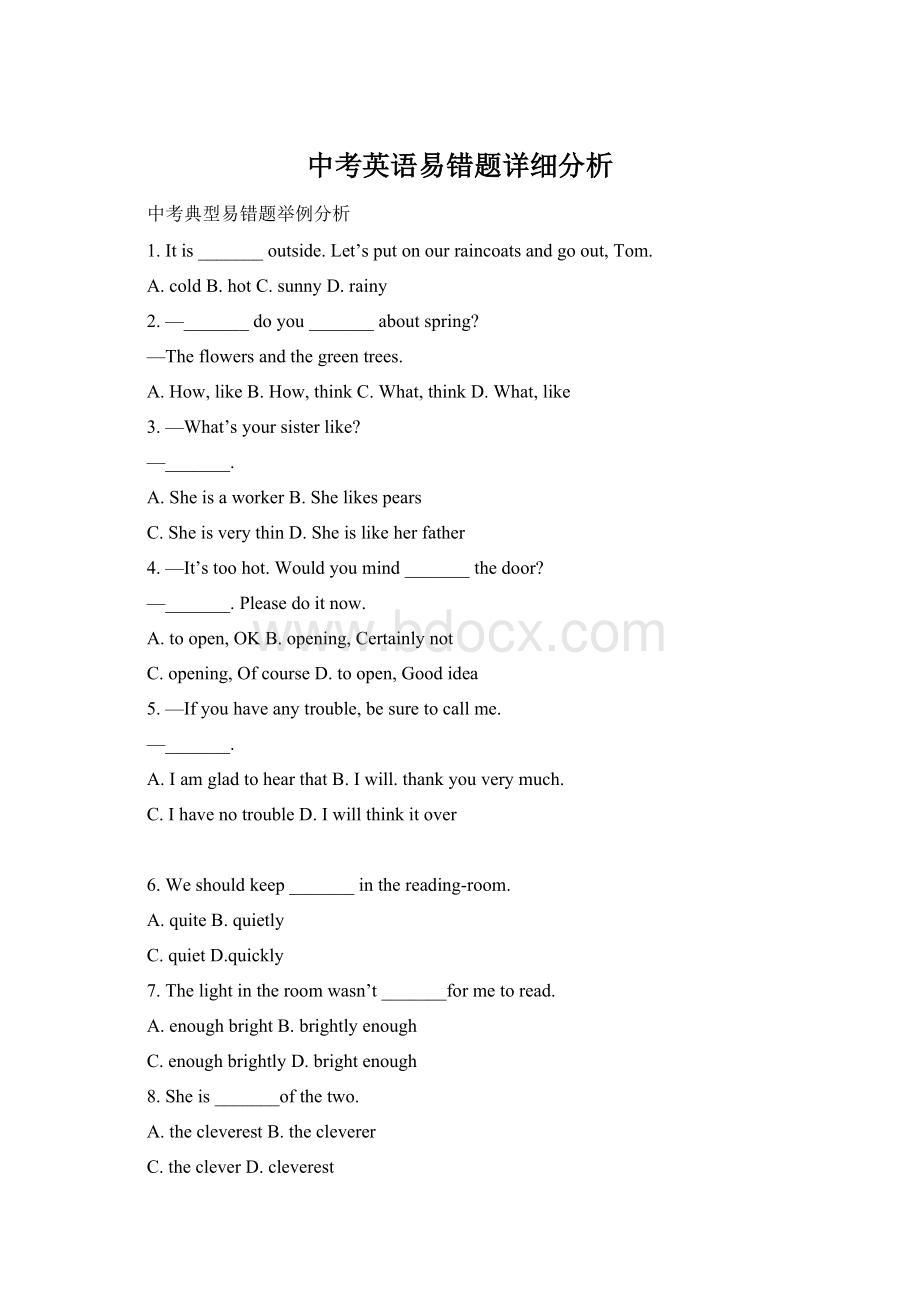中考英语易错题详细分析.docx
《中考英语易错题详细分析.docx》由会员分享,可在线阅读,更多相关《中考英语易错题详细分析.docx(7页珍藏版)》请在冰豆网上搜索。

中考英语易错题详细分析
中考典型易错题举例分析
1.Itis_______outside.Let’sputonourraincoatsandgoout,Tom.
A.coldB.hotC.sunnyD.rainy
2.—_______doyou_______aboutspring?
—Theflowersandthegreentrees.
A.How,likeB.How,thinkC.What,thinkD.What,like
3.—What’syoursisterlike?
—_______.
A.SheisaworkerB.Shelikespears
C.SheisverythinD.Sheislikeherfather
4.—It’stoohot.Wouldyoumind_______thedoor?
—_______.Pleasedoitnow.
A.toopen,OKB.opening,Certainlynot
C.opening,OfcourseD.toopen,Goodidea
5.—Ifyouhaveanytrouble,besuretocallme.
—_______.
A.IamgladtohearthatB.Iwill.thankyouverymuch.
C.IhavenotroubleD.Iwillthinkitover
6.Weshouldkeep_______inthereading-room.
A.quiteB.quietly
C.quietD.quickly
7.Thelightintheroomwasn’t_______formetoread.
A.enoughbrightB.brightlyenough
C.enoughbrightlyD.brightenough
8.Sheis_______ofthetwo.
A.thecleverestB.thecleverer
C.thecleverD.cleverest
.—Howfaristhefactoryfromhere?
—It’sabout4kilometres_______.
A.farB.long
C.awayD.near
10.—Doyouhaveenoughmentocarrythesechairs?
—No.Ithinkweneed_______men.
A.anotherB.othertwo
C.moretwoD.twomore
.Heistallerthan_______girlinhisclass.
A.anyB.other
C.anyotherD.another
12.Howbeautifullyshesings!
Ihaveneverheard_______voice.
A.thebestB.abest
C.thebetterD.abetter
13._______fathersmadethemhavepianolessons.
A.PeterandAnn’sB.Peter’sandAnn’s
C.Peter’sandAnnD.PeterandAnn
14.Therearealot_______peopletodaythanyesterday.
A.ofB./C.mostD.more
14.“Excuseme,areyou_______?
”
“No,weare_______.”
A.American,EnglishmanB.American,Germans
C.American,GermenD.Englishman,Americans
15.Aspaceshipfliesataboutelevenkilometers_______second.
A./B.theC.aD.an
16._______IndiaandChinaareof_______samecontinent.
A./;theB.The;theC./;/D./;a
17.—You’revery______,aren’tyou?
—Yes.Ourteamhaswonthegame.
A.happyB.worriedC.sadD.afraid
18.—YourspokenEnglishismuchbetter!
—______.
A.Oh,noB.You’rerightC.thankyouD.Notatall
19.Ihearsomeone_______atthedoor.Pleasegoandseewho_______is.
A.knock,heB.knocking,heC.knock,itD.knocking,it
20.LucyandIareclassmates.We_______inClassOne.
A.allareB.areallC.bothareD.areboth
21.Thereis_______eggathome.Willyoupleaseget_______forme,please?
A.no,someB.not,someC.notany,anyD.notan,any
22.—AlatestEnglishnewspaper,please!
—Onlyonecopyleft.Wouldyouliketohave_______,sir?
A.oneB.thisC.thatD.it
23.—Don’tmakeanynoiseinthelivingroom!
Mybabyissleeping.
—_______.
A.Sorry,Iwon’tB.Itdoesn’tmatter
C.Excuseme,I’mwrongD.Certainly,Iwon’t
24.—Ihaven’tseenJackforthreedays,isheill?
—_______.Hismothertoldmethathewasinhospital.
A.IamafraidsoB.Ihopenot
C.Idon’texpectD.Iamafraidnot
25.—Excuseme.MayIuseyourcomputer?
—_______.It’sbroken.
A.SureB.Yes,hereyouare
C.WithpleasureD.I’mafraidnot
26.—CanIgetyousomethingtodrink,MrSmith?
—_______.Iamthirsty.
A.HereyouareB.No,thankyou
C.You’rewelcomeD.Yes,please
27.—Yoursweaterisverybeautiful,Joan!
—_______.
A.thankyouallthesameB.Notatall
C.Justso-soD.thankyou
28.—Whatdoyoudo?
—_______.
A.IamthirteenB.Iworkhard
C.I’mfineD.I’mastudent
注意:
以下句型的意思:
Whatishe?
(用来询问职业)他是干什么的?
Whatdoeshedo?
(=What’shisjob?
)(用来询问职业)Whatishelike?
(用来询问长相或人品)他长得怎么样?
/他是怎样一个人?
Howishe?
(用来询问身体状况)他身体怎么样?
Howoldishe?
(用来询问年龄)他多大了?
29.—Andyisn’tgoingoutthisevening,isshe?
—_______.Shehastostayathometolookafterhersickmother.
A.Yes,sheisB.No,sheisn’t
C.Yes,sheisn’tD.No,sheis
30.—Hello.MayIspeaktoMr.Wang?
—Who’scalling,please.
—_______.
A.I’mMr.WangB.Mr.Wangishere
C.ThisisMr.WangspeakingD.Mr.Wangiscalling
31.—Ifellandhurtmylegjustnow.
—_______.
A.BecarefulB.Itdoesn’tmatter
C.I’msorrytohearthatD.Nothingserious
32.—_______.
—thankyouverymuch.Iwill.
A.Congratulations!
B.Bestwishestoyou
C.Pleasesayhellotoyourfamily. D.Whatagoodwishtoyourfamily!
33.Isthere______foodinthefridge?
I’mhungry.
A.someB.anyC.somethingD.anything
34.______haveyoubeentoXi’an?
—Twice.
A.HowsoonB.Howmanytimes
C.HowoftenD.Howlong
35.Shanghaiislargerthan____cityinNewZealand.
A.anyotherB.otherC.allotherD.any
36,—Wouldyoulikesomemorefish?
—______,I’mfull.
A.Yes,pleaseB.No,thanks
C.No,Iwon’thaveitD.Yes,Iwon’tto
37.IwillringyouupwhenI____Wuhantomorrow.
A.willreachB.reachedC.reachesD.reach
如果主句是一般将来时态、情态动词加动词原形、祈使句时,由if引导的条件状语从句和when,until,be-fore,after,assoonas引导的时间状语从句用一般现在时代替一般将来
38.Hetoldmethatsun____intheeast.
A.roseB.hadrisenC.risesD.haverisen
39.ThePeople’sRepublicofChinawasfounded.
A.onOctober1,1949 B.1949,onOctober1
C.inOctober1,1949 D.1949,inOctober1
40.Whichis____,themoonortheearth?
A.bigB.bigger C.biggestD.thebiggest
41.Thefarmersareallbusy____apples.
A.pickB.topickC.pickingD.topicking
enjoydoingsth,keep(sb/sth)doingsth,finishdoingsth,can’thelpdoingsth,feellikedoingsth,minddoingsth,prerferdoingsthtodoingsth等等。
现在完成时由“have/has+过去分词”构成。
其中的have/has为助动词,构成疑问句时,可将其提前;构成否定句时,可直接在其后加not。
二、掌握两种主要用法
现在完成时主要有两种用法,一种是已完成用法,也叫影响性用法;另一种是未完成用法,也叫持续性用法。
两种用法的特点是:
1.已完成用法(影响性用法):
该用法的现在完成时表示一个过去发生的动作在过去已经完成,并且这个过去发生并完成的动作对现在有影响或结果,同时说话强调的或感兴趣的就是这个影响或结果。
如:
Shehasleft.她离开了。
(对现在的影响或结果:
她现在不在这儿。
)
Hasshefoundhercarkey?
她找到她的车钥匙了吗?
(对现在的影响或结果:
她能开她的车了吗?
)
Ihavefinishedmywork.我的工作做完了。
(对现在的影响或结果:
现在我没事了。
)
Hehaseatennothingtoday.他今天什么也没吃。
(对现在的影响或结果:
他现在一定很饿。
)
2.未完成用法(持续性用法):
该用法的现在完成时表示一个过去发生的动作并未在过去完成,而是一直持续到现在,并且有可能继续下去(也可能到此结束)。
如:
Howhaveyoubeen?
你近来怎样?
Shehasbeenateacherfor20years.她已当了20年的老师。
Howlonghaveyoulivedhere?
你在这里住了多久了?
Theyhavebeenmarriedfortenyears.他们结婚已经10年了。
I’veknownherforalongtime.我认识她很长时间了。
注:
除以上用法外,现在完成时还可表示过去的重复动作甚至将来动作。
如:
Hehasalwaysgonetoworkbybike.他总是骑自行车上班。
I’llgotobedwhenI’vefinishedmyhomework.我做完作业后就上床睡觉了。
三、注意通常连用的副词
现在完成时通常连用的副词有already,never,ever,just,before,recently等。
如:
Wehavefinishedourworkalready.我们已经完成了工作。
Hehasneverdrivenacarbefore.他过去从未开过车。
Haveyoueverbeenateacher?
你当过教师吗?
She’sjustbeentoaparty.她刚参加一个晚会回来。
I’vejusthadsomephotostaken.我刚照了几张相。
但是,若不强调动作对现在的影响,这些副词也可用一般过去时。
如:
HejustarrivedinJapan.他刚到日本。
Suchthingsdidn’thappenbefore.那样的事以前没有发生过。
Ihearthathewentabroadrecently.我听说他最近出国了。
四、注意since与现在完成时的关系
since不管用作介词、连词还是副词,句子(主句)谓语通常都用现在完成时。
如:
Ihaven’tseenhersincelastweek.自上周以来我一直未见过她
Imethimin1975andhaven'tseenhimsince.1975年我见过他,但自那以后就一直未见到他。
Wehavebeengoodfriendssincewemetatschool.自从读书相识以来,我们一直是好朋友。
注:
表示时间长度时,通常用一般现在时代替现在完成时。
如:
It’salongtimesinceImetyoulast.好久不见了。
It’saboutsixmonthssincewearrivedhere.我们到这里大约有半年了。
五、注意现在完成时与一般过去时的区别
现在完成时的已完成用法很容易与一般过去时相混淆,其区别是:
前者强调对现在的影响和结果,后者不强调这个影响和结果,而是强调这个动作发生的时间是在过去。
如:
I’velivedherefortenyears.我在这里住了10年。
(现在仍住这儿)
Ilivedherefortenyears.我在这里住过10年。
(现在不住这儿了)
Hashegotup?
他起来了吗?
(着眼现在情况)
Didyougetupveryearly?
你起来很早吗?
(着眼动作本身)
I’vegotnonewsfromhim.我没听到他的消息。
(不知道他的情况怎样)
IgotthenewsfromJim.这消息我是从吉姆那听来的。
(单纯谈论动作)
六、掌握havebeento和havegoneto的用法区别
两者均可后接地点,前者表示去过某地,通常可与表示次数的状语连用;后者表示到某地去了,强调说话的当时去某地的人不在场。
比较:
ShehasbeentoEuropetwice.她到欧洲去过两次。
ShehasgonetoEurope.她到欧洲去了。
(即现在不在这儿)
注:
若其后不是接名词,而是接副词,则不用to。
如:
Hehasbeenabroadmanytimes.他多次出国。
Hehasgonehome.他回家去了。